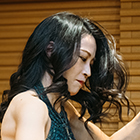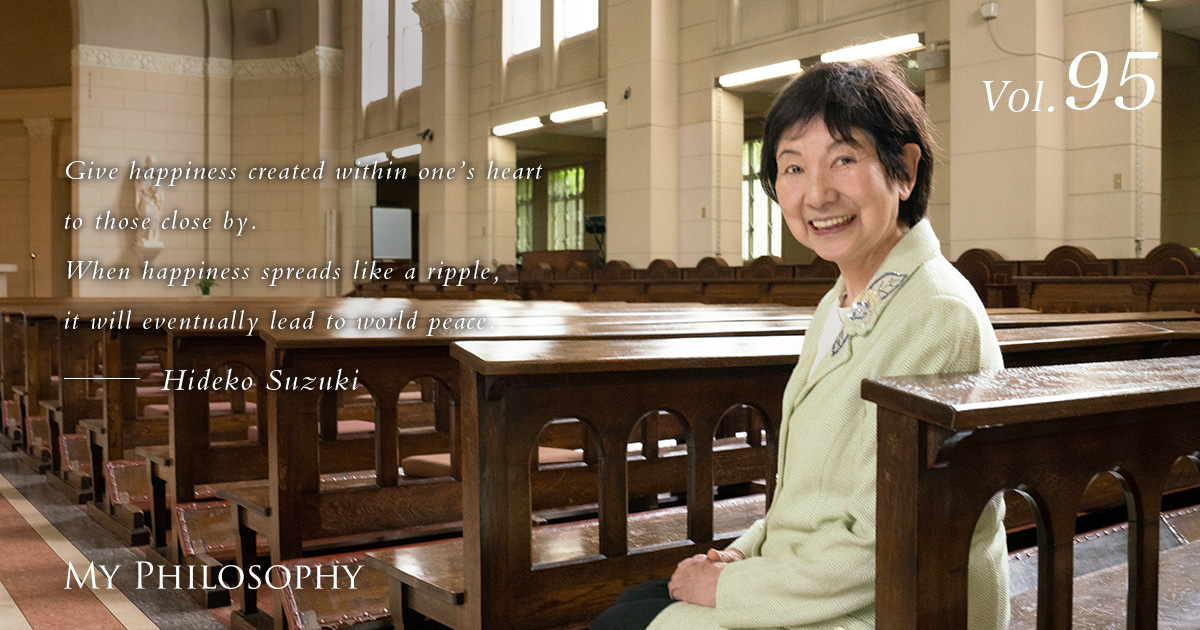
Ms. Hideko Suzuki, who first introduced the Enneagram (a theory of nine personality types) to Japan, asserts that "There is no greater happiness than in the mundane everyday." We had the opportunity to discuss with her the mindset for leading a fulfilling life.
Profile
Vol.95 Hideko Suzuki
Doctor of Literature | Critic
Born in 1932, she completed her doctoral course in the Graduate School of Humanities and Sociology at the University of Tokyo. She has taught at the University of Hawaii and Stanford University. Serving as a professor at the University of the Sacred Heart, honorary president of the International Communion Studies Association, a researcher at the University of the Sacred Heart Institute for Christian Culture, and a member of the Society of the Sacred Heart. Responding to invitations and requests from all over Japan and abroad, she leads lectures and workshops contemplating the meaning of life with her audience. Her major publications include "The Gift of Life: Overcoming the Great Hanshin Earthquake(Inochi no Okurimono Hanshin Daijishin wo Norikoete)" (Chuokoron-Shinsha, Inc.), "Nurturing Children: The Enneagram and the Best Parent-Child Relationship (Kodomo wo Nobasu ‘Kokonotsu no Seikaku’ Eniagram to Sairyo no Oyako Kankei)" (PHP Institute, Inc.), "The Reason We Are Given Life: Why Are We Born, and Where Do We Go (Ikasareru Riyu Hito wa na Doko he Ikunoka)?" (Gentosha Inc.), "It Is When Facing Headwinds That We Fly Highest" (Gyakufu no Tokikoso Takaku Toberu) (Seishun Publishing Co., Ltd.), "Focus Your Heart on What Is in Front of You Now (Ima, Menomae no Kotoni Kokoro wo Komenasai)" (Kairyusha) among many others.
Adversity as a Blessing
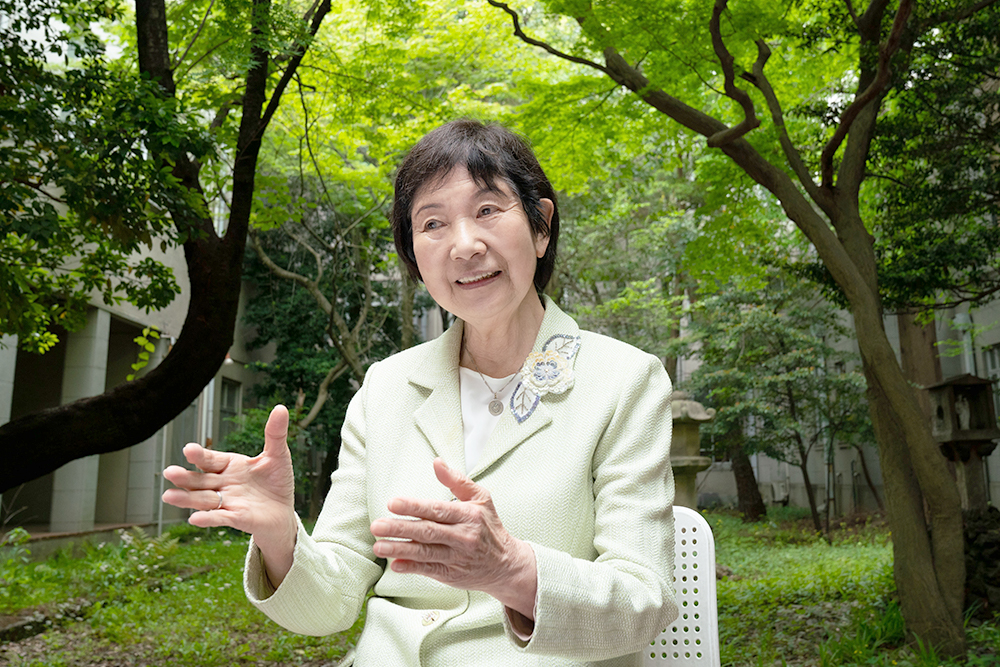
Many people come to me with their troubles, and I tell them that adversity is indeed a blessing. It’s hard to see it as such when you’re in the midst of it, but looking back after it has passed, you can often see how those experiences were crucial for your growth. Therefore, it’s good to understand during peaceful times that difficulties are blessings and opportunities for personal growth. This understanding will then become a source of strength when you face challenges. Additionally, those in difficult situations need people around them who can understand and empathize with their struggles. Being someone who can offer such support is also a key to a successful life.
There was a case of a mother who was seen as exemplary by others but was considered extremely strict by her daughter. The mother believed she had given her all and continuously showered her child with love. However, the problem was that she was not communicating in a way that her child could understand. Despite her efforts, her constant prohibitions made the child feel perpetually scolded. Raising children is also about raising oneself. Parents must educate themselves on how to communicate effectively so that their messages are clearly understood by their children. Isn’t it a parent’s duty to nurture their children into individuals who can live rich and fulfilling lives?
The Presence of Something Greater
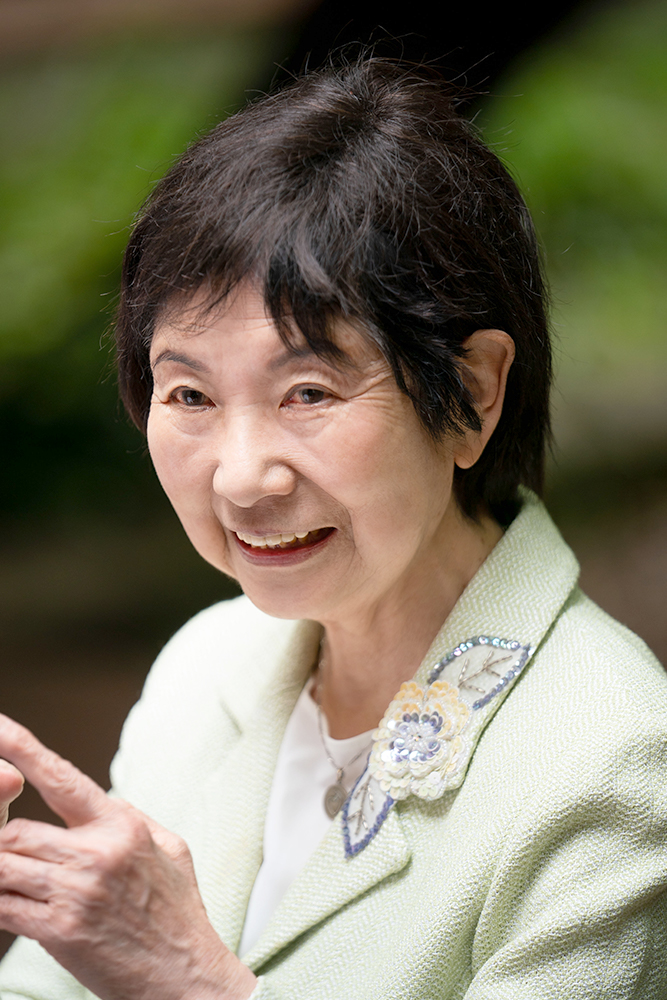
The end of the war, which I experienced as a child, drastically changed my values. Having seen everything I cherished change, I continually pondered whether there was anything in this world that remained constant. My dear friend, Ayako Sono, was told by a sister during her childhood that “Every person is created as a precious individual. While our personalities may differ, we are all equally endowed with life. This is the dignity of humanity. Therefore, let’s cherish our own lives,” teaching her about the existence of something that never changes.
If we refer to a presence greater than humanity as God, then I believe that living in connection with a God who knows our deepest flaws and weaknesses yet continues to forgive us is the utmost happiness. God is always with us, providing support when we need it the most, and even when bad things happen, God can lead us to good outcomes through those experiences. This is evidenced when people who claim not to believe in God face a sudden crisis and immediately cry out, “God, please help me.” Deep down, everyone knows that they are sustained by a presence greater than themselves, and they live in connection with that presence.
The Bible tells us, “You are so precious to God that He would stake his life to save you; hence, you should cherish yourself and grow to be a righteous person. Nurture yourself to achieve this. The best way to do this is to pour your heart and love into those near you, who are just as precious in the eyes of God. Help them grow into noble individuals. Do things that are helpful for them.” If we consider our connection with God as the vertical axis, then the horizontal axis represents the people around us. Starting with those close to us and extending our efforts to help those in need far away, such as refugees, is what I believe to be a significant action.
Illuminating One’s Heart
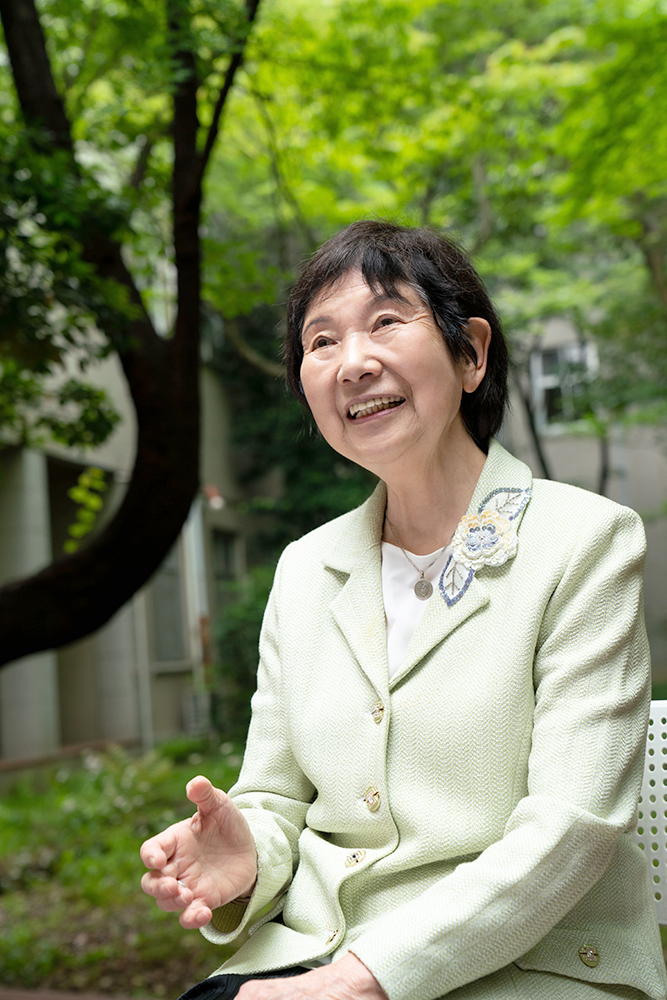
After the Great East Japan Earthquake, the word “bonds” was vocally emphasized. I visited shelters in Fukushima several times, where elderly individuals shared, “Though we lost our families, had we stayed alone at home, we could not have survived. By encouraging each other with those who also lost their families at the shelter, we can keep living.” We cannot live alone. The importance lies not in doing anything special, but in continuing to live while cherishing the invisible connections symbolized by “bonds” and valuing each individual.
In a time of poor public safety, the Mayor of New York initiated a campaign for the taxi industry, urging drivers to “Greet your customers with a smile and a good mood. Offer them warm words of thanks when they leave.” When drivers started saying, “Thank you for riding. Have a good day,” it brightened the hearts of customers who might have left their homes in a bad mood. This cheerfulness led them to greet their colleagues with a smile, who then treated their subordinates kindly, spreading like ripples. I believe that world peace begins with creating peace in one’s own heart, then offering that peace to those around us and to everyone we encounter today. This is the bond between people and leads to world peace. We often think happiness comes from great things happening or people acting as we wish, but happiness begins with feeling gratitude for the good things and seeing adversity as a blessing to overcome. True happiness comes from the ability to illuminate one’s own heart, creating joy within, a realization that marks the start of a fulfilling life.
The World of Bliss After Death
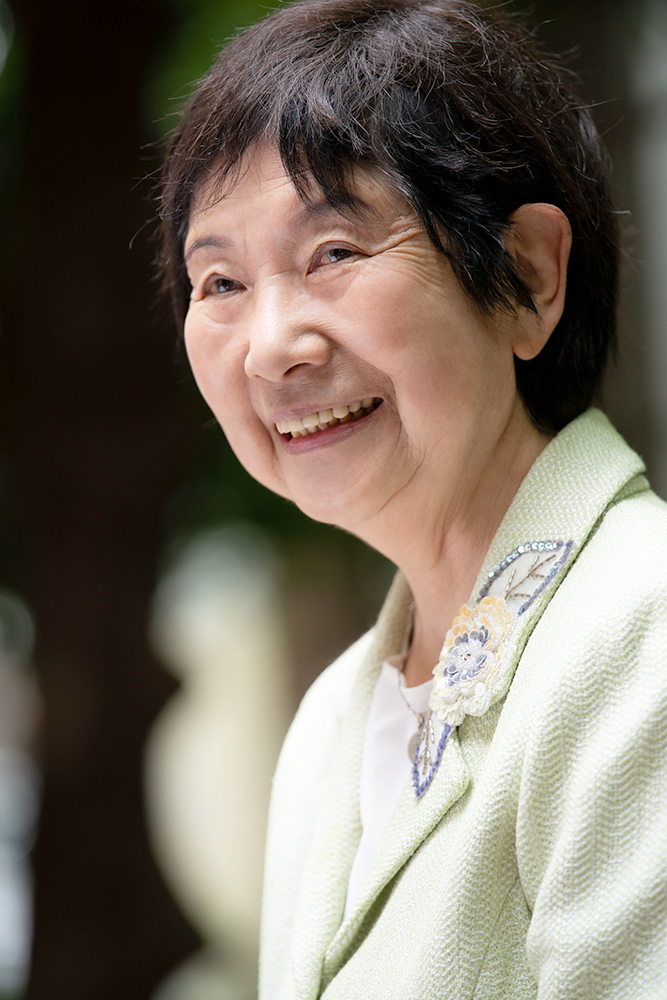
As I’ve grown older, there are times when my body doesn’t move as I wish. However, I don’t lament this nor rely solely on others; instead, I believe it’s crucial to cultivate the strength to accept reality and develop the judgment on how best to respond. I am not afraid of death. Death, to me, seems an opportunity for something profound to stir within, something that connects to the soul, the authentic self. Death is leaving behind all that is not the soul in this world, with only the true self returning to a world of bliss. Just as waves sparkle and burst forth on the ocean surface, each of us shines with individuality in the human world, floating on the surface until death returns us to the sea. This, I believe, is undoubtedly a world of bliss.
I am reminded of the importance for each of us to nurture a sense of happiness within ourselves. When one feels happy within, a natural sense of gratitude emerges. Everyone is drawn to such individuals. From them spreads a brightness and a zest for life. Thus, while achieving great things is important, I hope for a life where each day is about finding joy in oneself through the small things that happen in the daily routine and doing something beneficial for others.
Doctor of Literature, Critic – Hideko Suzuki
During a dinner with Ms. Yuko Sasagawa, the CEO of Imagine Plus, Inc., the topic of Sister Hideko Suzuki, who first introduced the Enneagram (a theory of nine personality types) to Japan, came up. This led to the realization of this interview.
Just listening to the gentle voice of Sister Suzuki made me feel incredibly at ease and as if a weight had been lifted off my shoulders. The part that resonated with me the most was her talk on “Adversity as a Blessing.” Life never goes perfectly 100% of the time, and no one is at their best every single day. I have personally felt that how one perceives the ups and downs and the sad events in life can change the way one walks through life.
Through this interview, I received energy from Ms. Suzuki to “move” forward by always carrying a sense of gratitude and focusing on the happiness that exists now. Inspired anew by the idea of “giving the happiness created within one’s heart to those close by,” I am motivated to take action.
May 2019, at Sacred Heart University








